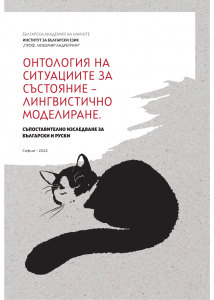The system of diatheses in Bulgarian and stative predicates
The system of diatheses in Bulgarian and stative predicates
Author(s): Svetla Koeva
Subject(s): Language studies, Language and Literature Studies, Theoretical Linguistics, Applied Linguistics, Syntax, Semantics, Psycholinguistics, Cognitive linguistics, Descriptive linguistics, South Slavic Languages
Published by: Институт за български език „Проф. Любомир Андрейчин“, Българска академия на науките
Keywords: diathesis; stative predicates; passives; middles; anticausatives; reciprocals; optatives
Summary/Abstract: The investigation is intended to provide a clear distinction between the category of grammatical voice in Bulgarian (grammatical diatheses) and lexical diatheses by analyzing grammatical facts and by applying semantic criteria. The category of (grammatical) voice is used to describe a wide range of phenomena. Only the lexical diatheses are presented in more detail: se passives, impersonal passives, middles, anticausatives, lexical reciprocals, optatives, impersonal optatives, property of “oblique” subject. The semantic and grammatical characteristics (arguments and semantic roles, verb aspect, transitivity, and morphological categories of the verb lemma) of the source and derivative diatheses are studied, compared, and described. A large number of the source diatheses affect imperfective verbs that may express activities or states; in such cases, the alternations may lead to one of the following configurations: activity – activity; activity – state; state – state. We trace the correlation between the diathesis type and the eventuality type in the context of the ontological description of the state predicates proposed in this study. The investigation is intended to provide a clear distinction between the category of grammatical voice in Bulgarian (grammatical diatheses) and lexical diatheses by analyzing grammatical facts and by applying semantic criteria. The category of (grammatical) voice is used to describe a wide range of phenomena. Only the lexical diatheses are presented in more detail: se passives, impersonal passives, middles, anticausatives, lexical reciprocals, optatives, impersonal optatives, property of “oblique” subject. The semantic and grammatical characteristics (arguments and semantic roles, verb aspect, transitivity, and morphological categories of the verb lemma) of the source and derivative diatheses are studied, compared, and described. A large number of the source diatheses affect imperfective verbs that may express activities or states; in such cases, the alternations may lead to one of the following configurations: activity – activity; activity – state; state – state. We trace the correlation between the diathesis type and the eventuality type in the context of the ontological description of the state predicates proposed in this study.
- Page Range: 117-160
- Page Count: 44
- Publication Year: 2022
- Language: English
- Content File-PDF

